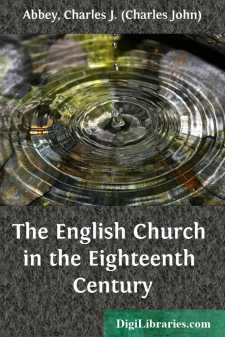Categories
- Antiques & Collectibles 13
- Architecture 36
- Art 48
- Bibles 22
- Biography & Autobiography 813
- Body, Mind & Spirit 141
- Business & Economics 28
- Children's Books 12
- Children's Fiction 9
- Computers 4
- Cooking 94
- Crafts & Hobbies 4
- Drama 346
- Education 46
- Family & Relationships 57
- Fiction 11826
- Games 19
- Gardening 17
- Health & Fitness 34
- History 1377
- House & Home 1
- Humor 147
- Juvenile Fiction 1873
- Juvenile Nonfiction 202
- Language Arts & Disciplines 88
- Law 16
- Literary Collections 686
- Literary Criticism 179
- Mathematics 13
- Medical 41
- Music 40
- Nature 179
- Non-Classifiable 1768
- Performing Arts 7
- Periodicals 1453
- Philosophy 64
- Photography 2
- Poetry 896
- Political Science 203
- Psychology 42
- Reference 154
- Religion 513
- Science 126
- Self-Help 83
- Social Science 81
- Sports & Recreation 34
- Study Aids 3
- Technology & Engineering 59
- Transportation 23
- Travel 463
- True Crime 29
The English Church in the Eighteenth Century
Description:
Excerpt
CHAPTER I.
INTRODUCTORY.
The claim which the intellectual and religious life of England in the eighteenth century has upon our interest has been much more generally acknowledged of late years than was the case heretofore. There had been, for the most part, a disposition to pass it over somewhat slightly, as though the whole period were a prosaic and uninteresting one. Every generation is apt to depreciate the age which has so long preceded it as to have no direct bearing on present modes of life, but is yet not sufficiently distant as to have emerged into the full dignity of history. Besides, it cannot be denied that the records of the eighteenth century are, with two or three striking exceptions, not of a kind to stir the imagination. It was not a pictorial age; neither was it one of ardent feeling or energetic movement. Its special merits were not very obvious, and its prevailing faults had nothing dazzling in them, nothing that could be in any way called splendid; on the contrary, in its weaker points there was a distinctly ignoble element. The mainsprings of the religious, as well as of the political, life of the country were relaxed. In both one and the other the high feeling of faith was enervated; and this deficiency was sensibly felt in a lowering of general tone, both in the domain of intellect and in that of practice. The spirit of feudalism and of the old chivalry had all but departed, but had left a vacuum which was not yet supplied. As for loyalty, the half-hearted feeling of necessity or expedience, which for more than half the century was the main support of the German dynasty, was something different not in degree only, but in kind, from that which had upheld the throne in time past. Jacobitism, on the other hand, was not strong enough to be more than a faction; and the Republican party, who had once been equal to the Royalists in fervour of enthusiasm, and superior to them in intensity of purpose, were now wholly extinct. The country increased rapidly in strength and in material prosperity; its growth was uninterrupted; its resources continued to develop; its political constitution gained in power and consolidation. But there was a deficiency of disinterested principle. There was an open field for the operation of such sordid motives and debasing tactics as those which disgraced Walpole's lengthened administration.
In the following chapters there will be only too frequent occasion to refer to a somewhat corresponding state of things in the religious life of the country. For two full centuries the land had laboured under the throes of the Reformation. Even when William III. died, it could scarcely be said that England had decisively settled the form which her National Church should take. The 'Church in danger' cries of Queen Anne's reign, and the bitter war of pamphlets, were outward indications that suspense was not yet completely over, and that both friends and enemies felt they had still occasion to calculate the chances alike of Presbyterianism and of the Papacy. But when George I. ascended the throne in peace, it was at last generally realised that the 'Settlement' of which so much had been spoken was now effectually attained. Church and State were so far secured from change, that their defenders might rest from anxiety. It was not a wholesome rest that followed. Long-standing disputes and the old familiar controversies were almost lulled to silence, but in their place a sluggish calm rapidly spread over the Church, not only over the established National Church, but over it and also over every community of Nonconformists. It is remarkable how closely the beginning of the season of spiritual lassitude corresponds with the accession of the first George. The country had never altogether recovered from the reaction of lax indifference into which it had fallen after the Restoration. Nevertheless, a good deal had occurred since that time to keep the minds of Churchmen, as well as of politicians, awake and active: and a good deal had been done to stem the tide of immorality which had then broken over the kingdom. The Church of England was certainly not asleep either in the time of the Seven Bishops, when James II. was King, or under its Whig rulers at the end of the century. And in Queen Anne's time, amid all the virulence of hostile Church parties, there was a healthy stream of life which made itself very visible in the numerous religious associations which sprang up everywhere in the great towns. It might seem as if there were a certain heaviness in the English mind, which requires some outward stimulus to keep alive its zeal....


